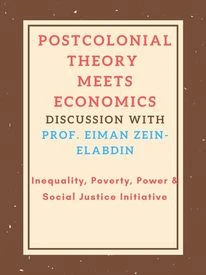"Postcolonialism meets Economics" A Discussion with Prof. Eiman Zein-Elabdin
Inequality, Poverty, Power & Social Justice Initiative, 2021
The postcolonial critique of Economics is one of the sharpest and most comprehensive indictments of the discipline, highlighting the discipline's limited treatment of power and culture and the incompatibility of the discipline's theoretical frameworks and predictions with the contexts of most formerly colonised territories. This interview of Prof. Eiman Zein-Elabdin provides important insights into this rich literature. Within the interview, Prof. Eiman Zein-Elabdin discusses what got her interested in postcolonial approaches to economics, the overlaps between this framework and institutional economics, how the mode of analysis handles duality and the less discussed differences between centrally planned and centrally managed economies specifically how the latter is more suited to understanding the experience of developing countries. Finally, she also discusses the contemporary applications of postcolonial approaches to economics by engaging with how it can be used to understand the growing wealth and income inequality as well as how it can be a useful tool for understanding the political economy of militarisation beyond the mainstream conceptualisations.
Comment from our editors:
This is a brilliant interview, made even better by the amazing questions from Danish Khan. Apart from breaking down a seemingly abstract concept into a relatable framework, this interview starts with a detailed discussion of the interdisciplinary bodies of work that shaped the work of Eiman Zein-Elabdin from the writings of Vandana Shiva to Arturo Escobar. This is a good sneak peek into the journey and the thought process behind this seminal body of work, the details of which are rarely found in most academic discussions. The understanding of colonisation used in this discussion is also a departure from most academic literature as she also considers pre-european domination such as the muslimisation of Africa and other forms of domination before that and how they shaped the economic systems of their colonies, complicating the mainstream understanding of the interactions of colonisation and economics or economic processes. Everyone who is interested in the interactions of power, culture and economics should definitely watch this!
Go to: "Postcolonialism meets Economics" A Discussion with Prof. Eiman Zein-Elabdin

